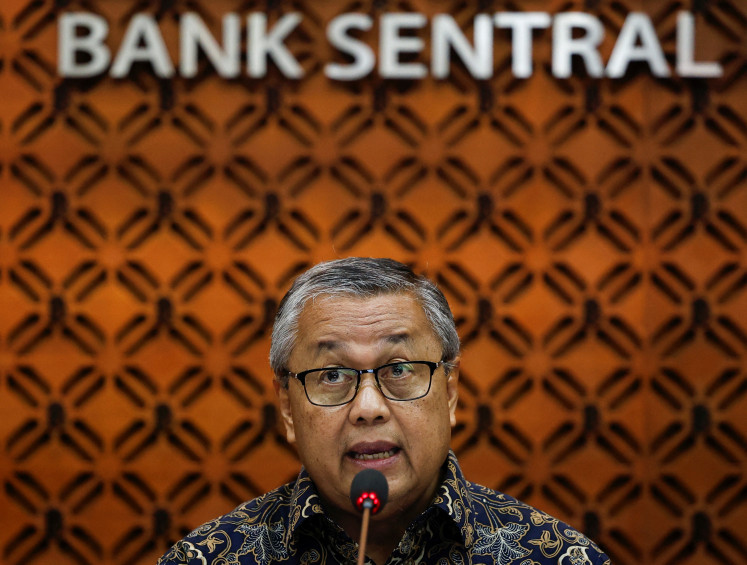Popular Reads
Top Results
Can't find what you're looking for?
View all search resultsPopular Reads
Top Results
Can't find what you're looking for?
View all search resultsCSR: CSR activities start to focus on youth empowerment
The corporate social responsibility (CSR) focus in Indonesia is changing dynamically in tandem with changing times and economic development
Change text size
Gift Premium Articles
to Anyone
T
he corporate social responsibility (CSR) focus in Indonesia is changing dynamically in tandem with changing times and economic development. Major natural resource-based companies are focusing CSR or community development (CD) programs more on building infrastructure, such as roads and bridges, in initial phases of operations, in addition to education and health concerns. Programs that empower small-and-medium scale enterprises (SMEs) have become popular over the past four years, along with a growing focus on young people. The Jakarta Post’s Sudibyo M. Wiradji talks to Yanti Triwadiantini, a specialist in CSR issues and an executive director of Indonesia Business Links (IBL), on the developing trends. The following are excerpts of the interview.
Question: There has been a shift in CSR program development orientation to empowering youth in Indonesia. Could you elaborate further on why this is?
Answer: Indonesia’s “youth” population (15-24 years) and elsewhere offers the potential for future human capital. Indonesia’s National Development Agency estimated that 30 percent out of 5.3 million unemployed individuals in Indonesia were youth. Unfortunately, the majority of them, particularly in poor villages or remote areas, do not have access to vocational education or decent employment opportunities. They are also not equipped with appropriate and adequate skills to enable them to enter the job market or to build their own businesses.
Q: With CSR programs focused more on youth empowerment, what about empowering SMEs, which serve as instruments to alleviating poverty and promoting people’s welfare?
A: CSR nowadays should be oriented toward sustainable development, through addressing youth empowerment that relates to corporate core interests and/or competences. Youth empowerment can be carried out through the following activities:
Facilitating youths entering the workforce while providing technical support and access to employment
Inspiring youths to run businesses while building support and providing access to the market
As such, helping youths to set up and run (their own) businesses will strengthen local economies in line with SME development. For companies, youth empowerment allows them to recruit good employees and to retain their loyalty. For financial institutions, youths represent future customers, hence companies must empower and lift their human capacity/knowledge.
Q: More companies seem to have become more aware of the need to conduct CSR programs over the last decade. How is the implementation CSR in Indonesia in terms of quantity and quality?
A: In terms of quantity, the increasing commitment of companies to implementing CSR has boosted the amount, although there has been lack of statistical data regarding this.
In terms of quality, companies are now more innovative and strategic in implementing CSR programs. Generally, there are three types of companies that are implementing social and environment related initiatives:
Multinational companies, which usually follow international guidelines and global corporate programs. Many of them have now adopted CSR as shared-values, including sustainable/green economy and responsible business.
State-owned companies, which comply with the BUMN Law, where each company sets aside 3-4 percent of profits after tax for community partnerships and environment stewardships.
Social enterprises, which comprise businesses (SMEs) that address social and environmental issues and civil society organizations, run businesses to serve communities (beneficiaries).
In the context of youth empowerment, the following are areas of interventions that companies can undertake to help raise Indonesian youth:
Building participatory planning with locals to find alternative solutions where CSR can play a role.
Capacity building; providing youths with life skills, basic rights and financial education.
Employment services; provides vocational training and job placement for youths.
Micro enterprise development; providing youths with entrepreneurship training and assisting them to build micro enterprises.
Consultancy; facilitating youths’ financial access to promote economic growth as individuals and entrepreneurs.
Q: Providing alternative sources of livelihood for forest communities is seen as one of the effective solutions of forest conservation problems, including illegal logging. How do you view this? How big is the commitment of natural resource-based companies on this?
A: The provision of alternative sources of livelihood for forest communities is a potential solution to forest conservation problems as well as social economic problems such as poverty. Companies that are exploiting natural resources, particularly mining and plantations, must be committed to finding innovative ways to provide these alternative sources of livelihood for their surrounding communities.
To date, there is an increasing commitment among natural resources based companies. However, the implementation has been patchy and inconsistent in many ways. Many companies implement CSR programs to merely respond to community demands, hence their programs are generally ad hoc and not sustainable. Only a few companies integrate local communities’ interests into their business models. For example, the model of perkebunan inti rakyat (plasma plantation), where the company allows local communities to plant and produce products and then sell those products to the company at acceptable prices based on partnership.
A similar model is applied by major consumer product companies like Unilever and Nestle for their soybean ketchup and coffee products, respectively. Other models applied by major mining companies, such as those in Papua (Freeport), NTT (Newmont), or Kalimantan (KPC) are geared toward empowering local communities to develop their local products and resources. The companies help them with technical assistance and access to the market.
Q: Many companies are said to still consider CSR programs as merely incidental activities, such as giving assistance to victims of disasters, giving donations, or other forms of charity and philanthropy. What’s your view on this?
A: Companies that still consider CSR as merely incidental activities must undertake review to evaluate the effectiveness of their program. In most cases, those companies did not undertake a proper needs assessment. Instead, they simply responded to demands on a seasonal or ad hoc basis. Consequently, they often became the targets of proposals for charity/donations, which do not lead to real solutions to the problem faced by their stakeholders.
Common dilemmas faced by companies in implementing CSR programs are usually due to different expectations and perceptions of stakeholders, for example local government and local communities, related to their “want or need” lists. Stakeholders often demand cash based on their “wants” and not their “needs” and even their personal gains. These situations corner companies and make them prone to threats. When they respond to the demands with cash, they become involved in bribery, a practice that is prohibited by internal corporate policies (globally/nationally)










